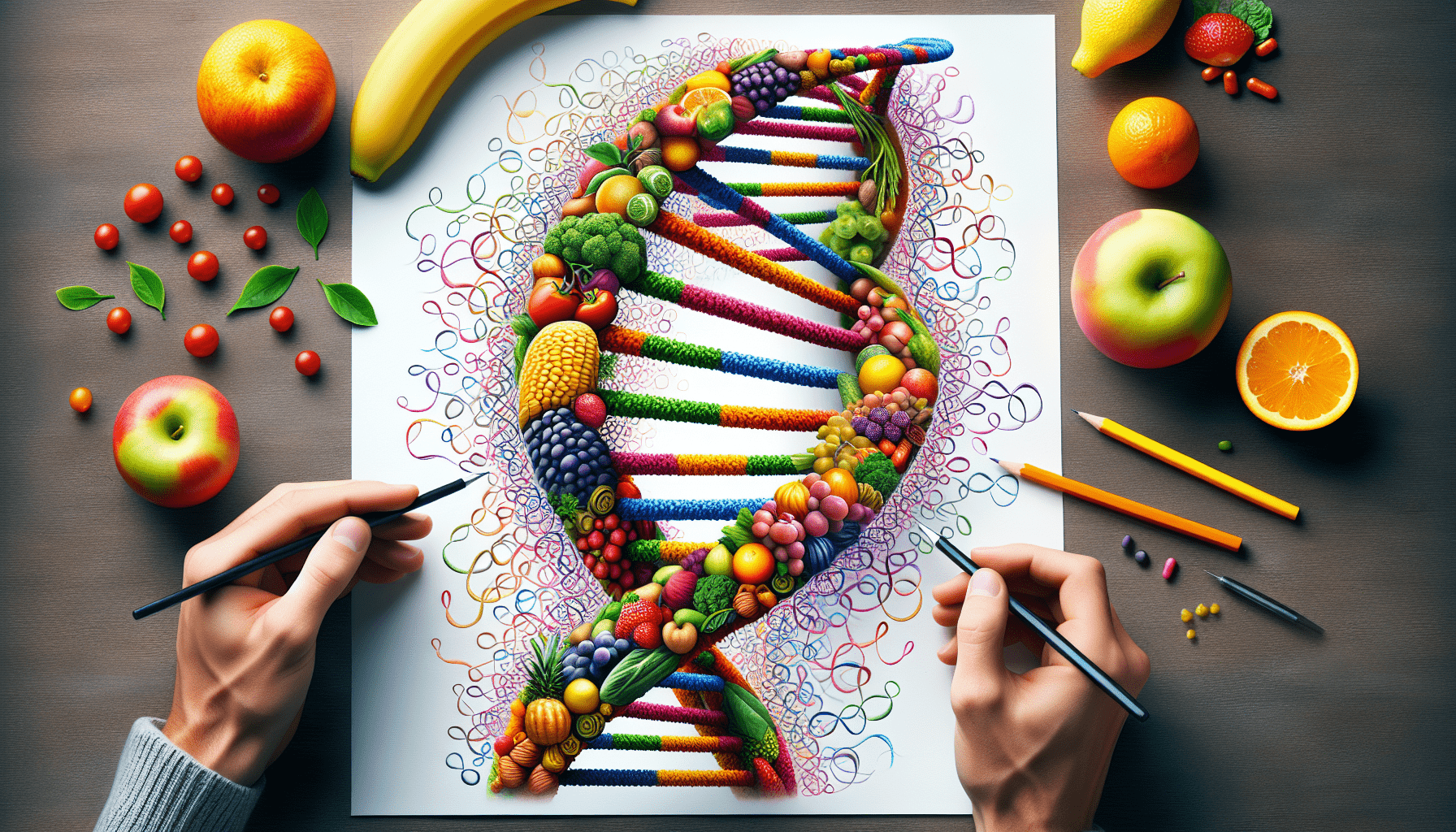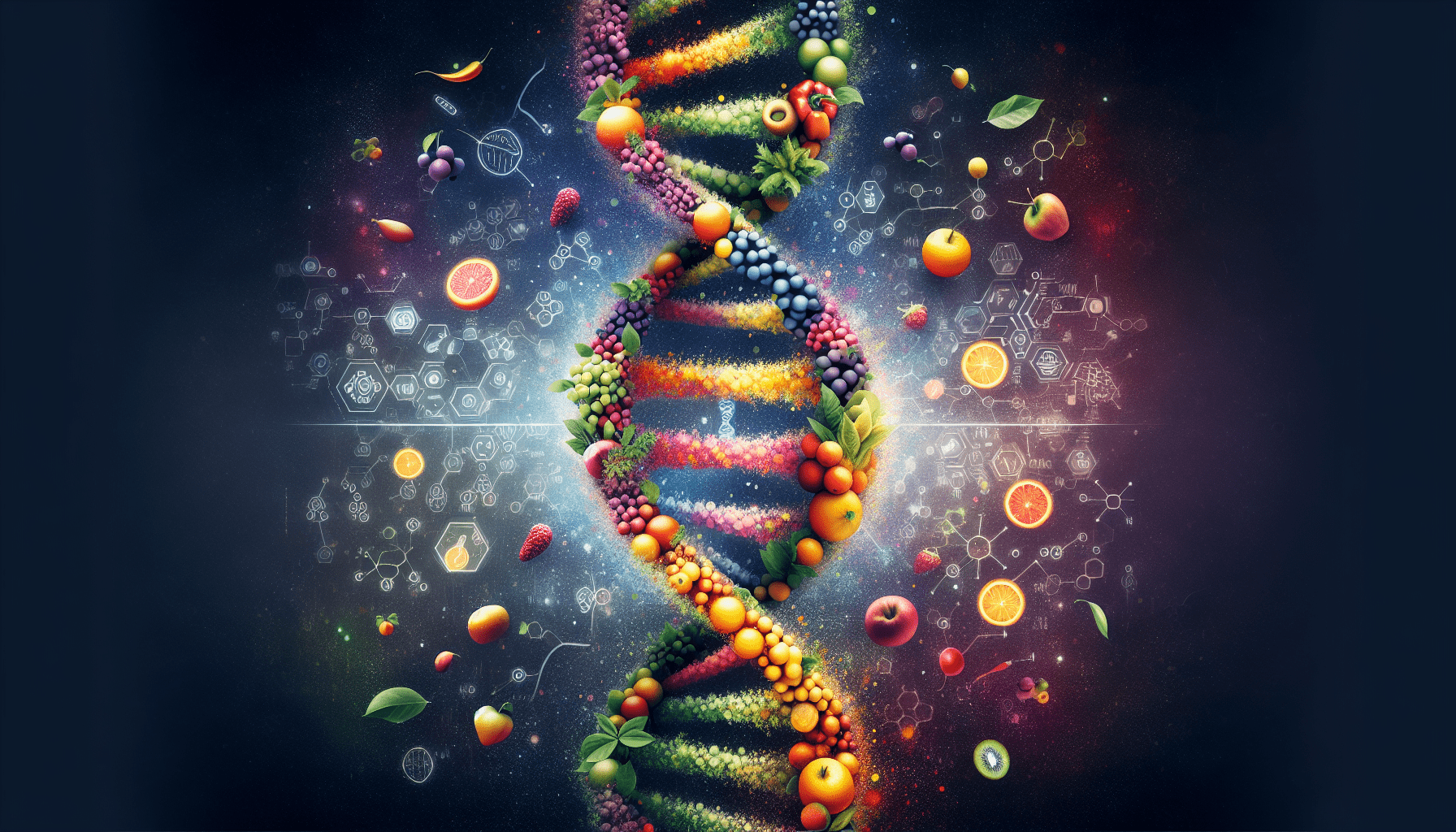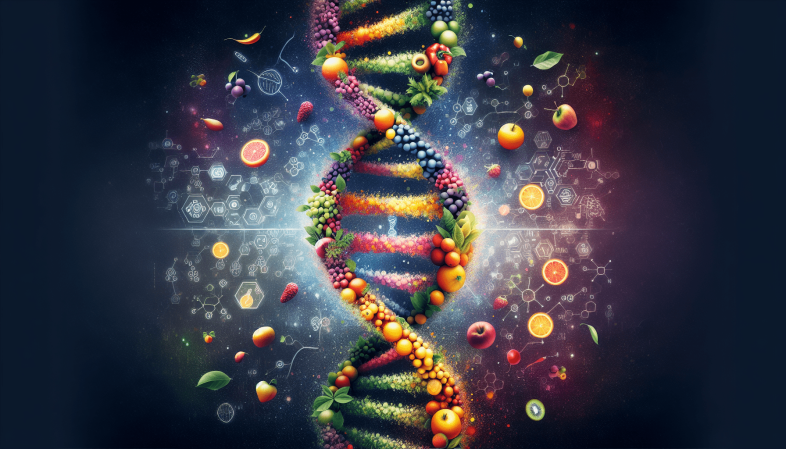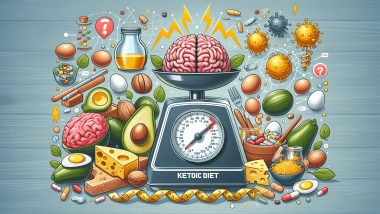Are you curious to learn how your genes have a profound impact on your nutritional needs? Look no further than the fascinating field of nutrigenomics, which explores the intricate relationship between our genetics and the foods we consume. By studying how our genes influence our ability to process nutrients, experts in this cutting-edge discipline are revolutionizing the way we approach nutrition. Join us as we unravel the mysteries of nutrigenomics and discover how this field is shaping the future of personalized nutrition.
Understanding Nutrigenomics
What is Nutrigenomics?
Nutrigenomics is a field of study that explores the relationship between nutrition, genes, and their impact on our overall health. It focuses on how individual genetic variations can influence our nutritional needs and how this knowledge can be used to optimize health outcomes.
How does it work?
Nutrigenomics works by analyzing an individual’s genetic makeup to determine how their genes interact with specific nutrients. Through this analysis, scientists can identify genetic variations that may affect how the body processes and metabolizes certain nutrients. By understanding these interactions, personalized dietary recommendations can be made to enhance overall health and prevent the onset of chronic diseases.
The relationship between genes and diet
Genes play a significant role in how our bodies respond to different nutrients and dietary patterns. Certain genetic variations can make an individual more susceptible to conditions like obesity, cardiovascular disease, or diabetes when exposed to an unhealthy diet. On the other hand, certain genes may confer protective effects and enhance the utilization of specific nutrients. Understanding these genetic influences allows for targeted dietary interventions and personalized nutrition plans.
Personalized Nutrition
Customized dietary recommendations
Personalized nutrition involves tailoring dietary recommendations to an individual’s unique genetic makeup. By analyzing an individual’s genetic profile, researchers can identify specific nutrient requirements, predispositions to certain conditions, or potential deficiencies. This information allows for personalized dietary recommendations that are tailored to optimize an individual’s health and well-being.
Tailoring nutrition based on genetic makeup
The genetic makeup of an individual can provide valuable insights into how their body may respond to different types of foods or nutrients. For example, some individuals may have genetic variations that affect their ability to metabolize certain types of fats or carbohydrates. By understanding these genetic traits, personalized nutrition plans can be designed to accommodate these variations and optimize nutrient utilization.
Optimizing health outcomes
By understanding an individual’s genetic predispositions and nutritional needs, personalized nutrition can help optimize health outcomes. This approach allows for the identification and prevention of potential health risks, such as nutrient deficiencies or an increased risk of certain chronic diseases. By tailoring nutrition to an individual’s genetic makeup, their overall health and well-being can be maximized.
Impact on Health and Disease
Prevention and management of chronic diseases
One of the significant impacts of nutrigenomics is its potential to prevent and manage chronic diseases. By understanding an individual’s genetic predispositions, personalized nutrition plans can be developed to mitigate the risk factors associated with conditions like obesity, diabetes, and cardiovascular diseases. Through optimized nutrition, individuals can reduce their risk of developing these diseases or better manage their existing conditions.
Identification of nutritional deficiencies
Nutrigenomics can also help identify potential nutritional deficiencies based on an individual’s genetic makeup. Certain genetic variations may affect nutrient absorption, utilization, or metabolism, leading to deficiencies in essential vitamins or minerals. Through personalized nutrition, these deficiencies can be addressed by recommending specific dietary modifications or targeted supplementation.
Reducing risk factors for inherited conditions
Certain genetic conditions have a direct impact on an individual’s nutritional needs. Nutrigenomics can aid in identifying and managing these genetic factors to reduce the risk of inherited conditions or lessen their severity. By understanding the specific dietary requirements associated with these conditions, personalized nutrition plans can be implemented to optimize health and well-being.
Nutrigenomics and Weight Management
Genetic factors influencing weight
Genetic variations can influence an individual’s predisposition to weight gain, weight retention, or weight loss. Nutrigenomics can help identify these genetic factors and create personalized diet plans that take into account an individual’s unique genetic makeup. By considering genetic variations related to metabolism, appetite regulation, or fat storage, tailored nutritional strategies can be developed to support weight management goals.
Customized diet plans for weight loss
Nutrigenomics provides valuable insights into an individual’s genetic factors that may contribute to weight gain or difficulty in losing weight. By analyzing these genetic variations, personalized dietary plans can be created to optimize weight loss efforts. These customized plans may include recommendations for specific nutrient ratios, meal timings, or even food preferences that align with an individual’s genetic traits.
Role of genetics in metabolism
Metabolism plays a crucial role in weight management, and genetics significantly influence an individual’s metabolic rate and nutrient utilization. By analyzing an individual’s genetic profile, nutrigenomics can shed light on their specific metabolic tendencies. This information can be used to design personalized nutrition plans that support efficient metabolism and promote weight management.

Sports Performance and Nutrigenomics
Maximizing athletic performance through genetics
Nutrigenomics has the potential to optimize athletic performance by tailoring nutrition plans to an individual’s genetic makeup. Genetic variations related to muscle strength, endurance, or recovery can be identified, allowing for personalized nutritional interventions. By understanding an athlete’s genetic potential, training and dietary recommendations can be modified to enhance their performance and maximize their athletic achievements.
Adapting nutrition to support physical goals
Different physical goals, such as muscle gain, weight loss, or stamina building, may require varying nutritional approaches. Nutrigenomics can help athletes and coaches understand the specific nutritional requirements of individuals based on their genetic variations. By aligning nutrition with an individual’s genetic traits, optimal performance can be achieved, and physical goals can be effectively pursued.
Enhancing recovery and reducing injury risk
Nutrition plays a vital role in post-exercise recovery and injury prevention. Nutrigenomics can identify genetic variations associated with these factors, allowing for personalized nutritional strategies that aid in faster recovery and reduce the risk of injuries. By addressing specific genetic traits, dietary interventions can be implemented to optimize recovery processes and support long-term athletic performance.
Prenatal Nutrition and Nutrigenomics
Effects of maternal nutrition on fetal development
Maternal nutrition plays a critical role in fetal development and long-term health outcomes. Nutrigenomics can provide valuable insights into the specific nutritional requirements of expecting mothers based on their genetic makeup. By understanding genetic variations related to nutrient absorption, metabolism, or utilization, personalized prenatal diets can be designed to support optimal fetal development and reduce the risk of birth defects or complications.
Implementing personalized prenatal diets
Through nutrigenomics, personalized prenatal diets can be implemented to ensure that expecting mothers receive the necessary nutrients to support both their own health and the development of their baby. Genetic variations related to nutrient requirements, potential deficiencies, or sensitivity to certain foods can be considered when designing these personalized diets. By tailoring nutrition to an individual’s genetic traits, optimal outcomes for both mother and child can be achieved.
Preventing birth defects and complications
Certain genetic variations can increase the risk of birth defects or complications during pregnancy. Nutrigenomics can aid in identifying these genetic factors and implementing dietary interventions to reduce these risks. By understanding an individual’s genetic makeup, personalized nutrition plans can be developed to optimize fetal development, support maternal health, and prevent potential complications.
Nutrigenomics and Aging
Understanding the role of genetics in aging
Aging is a complex process influenced by a combination of genetic and environmental factors. Nutrigenomics helps to unravel the genetic components of aging by identifying specific genetic variations associated with age-related conditions. By understanding an individual’s genetic predispositions, personalized nutrition plans can be developed to support healthy aging, promote longevity, and reduce the risk of age-related diseases.
Promoting healthy aging through personalized nutrition
Nutrigenomics plays a vital role in promoting healthy aging by tailoring nutrition plans to an individual’s genetic traits. By identifying genetic variations associated with age-related conditions such as cognitive decline or chronic diseases, personalized nutrition strategies can be implemented. These strategies may include dietary recommendations that focus on specific nutrients, antioxidants, or anti-inflammatory components to support healthy aging.
Preventing age-related diseases
Age-related diseases, such as Alzheimer’s, osteoporosis, or cardiovascular diseases, are influenced by a combination of genetic and lifestyle factors. Nutrigenomics can identify genetic variations associated with these conditions, allowing for targeted dietary interventions that reduce the risk of their development. By optimizing nutrition based on an individual’s genetic makeup, the onset and progression of age-related diseases can be mitigated.

Gene-Diet Interaction Studies
Research on gene-diet interactions
Gene-diet interaction studies are at the forefront of nutrigenomic research. These studies aim to understand how an individual’s genetic makeup interacts with specific dietary components or patterns. By analyzing the effects of gene-diet interactions, researchers can gain valuable insights into the mechanisms behind personalized nutrition and optimize health outcomes.
Major findings and implications
Gene-diet interaction studies have revealed significant findings that have reshaped our understanding of nutrition and health. For example, certain genetic variations have been linked to a higher risk of developing specific conditions, such as lactose intolerance or gluten sensitivity. This knowledge allows for targeted dietary modifications to reduce the risk of adverse reactions or improve overall health outcomes.
Future directions in nutrigenomic research
As nutrigenomics continues to advance, further research is needed to deepen our understanding of gene-diet interactions and their impact on health. Future directions in nutrigenomic research involve exploring more precise genetic markers, further refining personalized nutrition recommendations, and analyzing the long-term effects of tailored dietary interventions. This research is essential for realizing the full potential of nutrigenomics in optimizing individual health outcomes.
Ethical and Social Considerations
Privacy and genetic data
The use of genetics in personalized nutrition raises concerns about privacy and the handling of genetic data. Given the sensitive nature of genetic information, ethical guidelines and stringent data protection measures must be in place to ensure confidentiality and prevent misuse. Individuals participating in nutrigenomics studies or utilizing personalized nutrition services should have the confidence that their genetic data is protected and used only for research and healthcare purposes.
Access and affordability of personalized nutrition
As with any emerging field, the accessibility and affordability of personalized nutrition based on nutrigenomics remain considerations. Ensuring widespread access to personalized nutrition services requires overcoming various challenges, including the availability of genetic testing, data analysis, and the expertise to interpret and implement personalized nutrition plans. Efforts must be made to make personalized nutrition more accessible and affordable to individuals from diverse socioeconomic backgrounds.
Cultural and societal implications
Personalized nutrition based on nutrigenomics may present cultural and societal challenges. Traditional dietary practices, food preferences, and cultural beliefs can significantly influence an individual’s diet. Incorporating these factors into personalized nutrition plans is essential for effective implementation and acceptance of these interventions. Ensuring diversity and cultural sensitivity in personalized nutrition approaches can help overcome potential barriers and enhance overall health outcomes for individuals from different backgrounds.
Limitations and Challenges
Accuracy and reliability of genetic testing
One of the key challenges in nutrigenomics is the accuracy and reliability of genetic testing. Although advancements have been made in genetic analysis techniques, there is still room for improvement in terms of accuracy and standardization. Ensuring the reliability of genetic tests is crucial to provide individuals with accurate information about their genetic makeup and optimize personalized nutrition interventions.
Interpreting complex genetic information
Interpreting complex genetic information and translating it into practical dietary recommendations can be challenging. Nutrigenomics involves analyzing numerous genetic variations and their potential interactions with nutrients, making it a complex field. Ensuring that healthcare professionals and nutritionists have the necessary expertise to interpret and communicate genetic information effectively is crucial for the successful implementation of personalized nutrition plans.
Integration into healthcare systems
Integrating personalized nutrition based on nutrigenomics into healthcare systems poses challenges. Healthcare professionals need to be trained and educated about the field to incorporate personalized nutrition into their practice effectively. Additionally, there is a need for infrastructure and resources to support the implementation of personalized nutrition services, such as genetic testing facilities and data analysis capabilities. Collaborative efforts from researchers, policymakers, and healthcare providers are essential to ensure the seamless integration of nutrigenomics into healthcare systems.
In conclusion, nutrigenomics has immense potential to revolutionize personalized nutrition and optimize health outcomes. By understanding the complex interactions between genes and diet, personalized nutrition plans can be tailored to an individual’s unique genetic makeup. From weight management to sports performance, prenatal nutrition to healthy aging, nutrigenomics provides valuable insights into optimizing nutrition for various aspects of life. Despite the challenges and considerations surrounding privacy, accessibility, and interpretation of genetic information, nutrigenomics offers a promising approach to improving individual health and well-being. Continued research and advancements in the field will further refine the personalized nutrition paradigm and pave the way for a healthier future.

